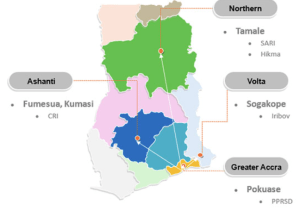Stakeholders in Ghana engage on yam and banana seed system roadmaps
The Program for Seed System Innovation for Vegetatively Propagated Crops in Africa (PROSSIVA) aims to support agricultural development by conducting innovative research to make the seed systems of banana, cassava, sweet potato, and yam more functional.
As part of the project’s ongoing work, a team comprising members from IITA, Resourced, and SAHEL Consulting embarked on a learning visit to seed system stakeholders in Ghana from 21 February to 1 March. The mission was to understand the current context and develop seed system road maps for plantain and yam that align with PROSSIVA’s overall goal of creating and developing profitable and sustainable vegetatively propagated crop (VPC) seed systems.

During the visit, there were strategic engagements with key partners of PROSSIVA, including the Crop Research Institute (CRI), Volta Mills and Allied Farms, Savanna Agricultural Research Institute (SARI), HIKMA Agro Services, Iribov West Africa Ltd, Plant Protection and Regulatory Services Directorate (PPRSD), seed entrepreneurs, and farmers. These stakeholders play a crucial role in the success of the project.
The visiting team worked with all actors to craft robust seed system road maps for Ghana, integrating seed actors’ priorities, needs, and capacity in alignment with project objectives. The team examined the plantain and banana seed system landscape and identified priority areas for intervention toward developing a formal seed system, which currently does not exist for these crops.
PROSSIVA will pilot rapid multiplication technologies while fostering linkages between research institutions, seed companies, and entrepreneurs to enhance the availability of high-quality planting materials. Activities such as conducting training sessions on propagation technologies and developing profitable business models will be undertaken to boost the demand for superior planting materials.
PROSSIVA will support partners in refining rapid multiplication technologies for the yam seed system to meet the escalating demand for high-quality mini tubers of preferred genotypes. Collaborative efforts with CRI, SARI, and the commercial seed companies will streamline production processes, ensuring timely access to clean early-generation seeds.
A pivotal moment during the visit was the handover to SARI of 126 clean yam seed tubers of recently registered landraces, marking a significant stride towards improving farmers’ access to quality seeds of preferred varieties. The virus-free tubers will be multiplied by SARI to generate stocks for seed companies and entrepreneurs to produce certified seeds for farmers.

Some challenges highlighted during the visit included the long time required to bulk up clean early-generation seed to meet the anticipated high demand and the limited public resource allocation for developing seed systems. It was also noted that succession planning is needed to ensure the continuity and efficacy of seed system operations at the research institutes. There is also a need to develop training manuals for seed production technologies, and production planning needs to be optimized.
In the future, the PROSSIVA team will work with partners in Ghana to align work plans and implement prioritized activities on the seed system roadmaps. As in other countries where PROSSIVA is being implemented, a key target will be to streamline seed production throughout the value chain, from the earliest stages of production by research stations down to last-mile production by community-based entrepreneurs.
PROSSIVA reaffirms its dedication to driving impactful change within Ghana’s agricultural landscape by developing functional plantain and yam seed systems, which will boost incomes and food security in the country and profoundly impact the local community. This project has the potential to be scaled to other countries, further amplifying its significance.
Contributed by Delphine Amah and Olusola Bodunde
